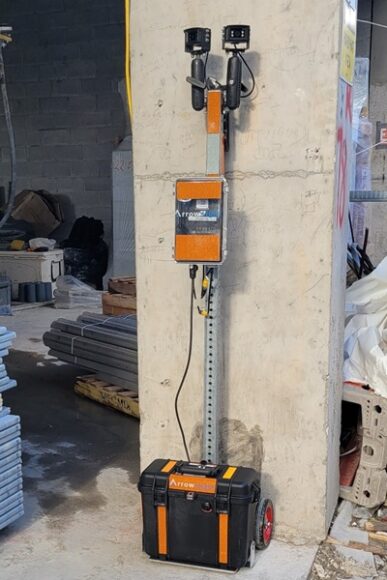A three-year pilot program using video surveillance and coaching at New York City construction sites led to enhanced job safety and a more than 50% drop in workers’ compensation claims frequency.
According to insurer Zurich North America, Zurich Resilience Solutions (ZRS), the video technology firm Arrowsight, and major construction firms that collaborated on the pilot, the results exceeded expectations.
For the pilot, Arrowsight deployed its cameras and coaching system on eight large-scale general building projects plus one heavy-civil project, cumulatively valued at more than $2 billion.
Zurich tracked claim frequency data for the nine New York City building projects that were equipped with Arrowsight cameras and 12 New York City projects without them across the highest-risk phases of the work. The results of its underwriting study found that the sites with Arrowsight technology saw more than a 50% reduction in the frequency of claims compared with the non-Arrowsight projects.
The pilot was made possible by contractors that were willing to invest in an approach to safety that combined human insight and coaching with technology, according to Tobias Cushing, Zurich’s head of Construction. “We saw a virtual elimination of serious injuries and deaths on projects with Arrowsight,” Cushing said.
Top contractors including Skanska, Suffolk, Gilbane, Posillico and Tutor Perini participated in the program.

Adam Aronson, CEO of Arrowsight, maintains that increasing safety so significantly for workers while reducing risk and possible fraud with its approach is a “game-changer” for industry. He said the reduced insurance claims are a direct result of increasing worker safety compliance rates from around 70% before the implementation of Arrowsight to 97% to100% in many cases now. “It’s especially transformative to see in some cases increases to over 97% compliance for wearing fall protection—because falls are a leading cause of catastrophic loss and death,” Aronson said.
Arrowsight also said the pilot saw a “near elimination” of racketeering charges on the projects.
Arrowsight uses fixed-point cameras and human-led video review to flag both risky and exemplary safety behaviors each day on jobsites, enabling timely coaching and adjustments together with ZRS engineers. The Arrowsight system is designed with moveable, battery-powered and cell-enabled cameras that can operate even without electricity or internet.
The results have prompted Zurich to require the Arrowsight technology for all construction wrap-up projects it insures in New York, where the insurer says the costs of insurance, as well as frequency and severity of claims, are among the highest in the nation. Many of these claims are paid within the insured’s deductible or retention, so reducing those losses both protects their workers and supports their profitability, the firms noted.
Zurich is also now offering the enhancement across the country with Arrowsight as its exclusive provider of camera-enabled technology for construction jobsites. ZRS, in turn, has become Arrowsight’s exclusive provider of third-party risk engineering services.
According to the announcement of the pilot, one participating construction firm, Suffolk, said it has seen approximately four times fewer claims and 10 times lower incurred losses on its projects. “Zurich risk engineers are now continuously engaged with our project teams, adding even more value—they are included on daily coaching reports and flagged videos, and they participate in bi-weekly coaching sessions with our field staff and the Arrowsight team,” said Doug Ware, senior vice president for risk management at Suffolk.
Also, according to the announcement, Posillico Inc., a New York heavy-civil construction firm, conducted its own four-year pilot and study using Arrowsight cameras on several projects where Zurich was the insurer for one of them. Posillico reported that its experience modification rate (EMR), a key claims-incident rating that factors into workers’ compensation premiums, dropped from .65 to .25. EMR represents a relative safety score, with scores less than 1.0 being favorable.
Topics Claims Workers' Compensation Talent
Was this article valuable?
Here are more articles you may enjoy.



 Munich Re Unit to Cut 1,000 Positions as AI Takes Over Jobs
Munich Re Unit to Cut 1,000 Positions as AI Takes Over Jobs  Viewpoint: Runoff Specialists Have Evolved Into Key Strategic Partners for Insurers
Viewpoint: Runoff Specialists Have Evolved Into Key Strategic Partners for Insurers  State Farm Adjuster’s Opinion Does Not Override Policy Exclusion in MS Sewage Backup
State Farm Adjuster’s Opinion Does Not Override Policy Exclusion in MS Sewage Backup  World’s Growing Civil Unrest Has an Insurance Sting
World’s Growing Civil Unrest Has an Insurance Sting 

